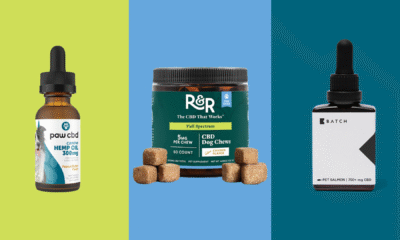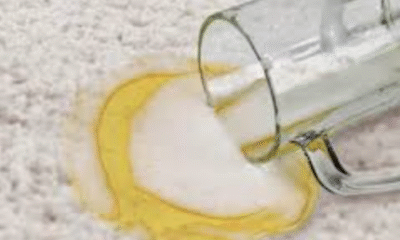featured
Marijuana Users Are Nearly 5 Times As Likely To Regularly Exercise Than Eat Fast Food, Stereotype-Busting Survey Shows
Published
2 days agoon

Marijuana consumers are more than three times more likely to regularly exercise than drink alcohol—and they’re nearly five times more likely to routinely work out than eat fast food—according to another stereotype-defying survey.
The poll from the cannabis telehealth platform NuggMD looked at the habits of cannabis users, who were asked about the frequency they engage in seven different activities—from alcohol consumption to movie theater attendance.
One of the takeaways was that marijuana consumers reported regularly engaging in exercise (27.4 percent daily and 34.9 percent multiple times per week) significantly more often than using alcohol (6.1 percent daily and 11.3 percent multiple times per week).
Another finding from the survey was that cannabis consumers are 4.8 times more likely to regularly exercise than to eat fast food (1.5 percent daily and 11.5 percent multiple times per week).
“This finding is yet more evidence that today’s cannabis consumers defy the prohibitionist stereotype of layabouts munching Doritos and then crossfading with booze to get their fix,” Andrew Graham, head of communications at NuggMD, told Marijuana Moment.
“The data shows that cannabis consumers self-report several healthy lifestyle habits. When compared with federal data on exercise and fast food consumption, our poll shows that cannabis consumers are in fact more likely to exercise and less likely to eat fast food than the average U.S. adult,” he said. “Previous polling we’ve done shows cannabis has a distinct replacement effect on alcohol use, and this poll charts a similar direction.”
“For millions of wellness-focused Americans, cannabis is simply part of the routine. It’s kind of mind-blowing how wrong the prohibitionist crowd is about everything,” Graham said.
Several other studies have similarly found that cannabis users exercise at average or above-average levels compared to non-users, bucking the long-held stigma that marijuana makes people lazy. This is one of the latest data points to show the same.
Notably, the new poll also found that relatively few marijuana consumers frequently use food delivery services, with just 3.3 percent reporting that they order delivery daily and 8.3 percent saying they use such services multiple times a week.

Via NuggMD.
In contrast, 69.5 percent of respondents said they drink coffee regularly. Only 4.5 percent said they often visit movie theaters. And 64.8 percent said they routinely take nutritional supplements.
The survey from NuggMD involved interviews with 603 cannabis consumers, with a +/- 4 percentage point margin of error.
Meanwhile, last year a study found that marijuana consumption prior to exercise can lead to greater enjoyment and an enhanced “runner’s high.”
Another study published in 2023 surveyed 49 runners and found that participants experienced “less negative affect, greater feelings of positive affect, tranquility, enjoyment, and dissociation, and more runner’s high symptoms during their cannabis (vs. non-cannabis) runs.” Participants did run 31 seconds slower per mile when using marijuana, but researchers said that was not statistically significant.
The positive effects of cannabis that the runners reported is consistent with the findings of a 2019 study, which found that people who use marijuana to elevate their workout tend to get a healthier amount of exercise.
Older people who consume cannabis are also more likely to engage in physical activity, according to another study that was published in 2020.
Similarly, in another stereotype-busting study that was published in 2021, researchers found that frequent marijuana consumers are actually more likely to be physically active compared to their non-using counterparts.
Marijuana Dispensary Offers Free Joints For Pics Of Bigfoot Following Local Sighting

Author: mscannabiz.com
MScannaBIZ for all you Mississippi Cannabis News and Information.
You may like
-


Best Cannabis Companies to Work For — 2026 Now Open for Entries
-


Best CBD for dogs of 2025 by Leafly
-


Texas Governor Signs Bill To Create Ibogaine Research Consortium, Aiming To Develop FDA-Approved Psychedelic Drug
-


Is Cannabis Part Of Memorial Day’s Beer Sales Drop
-


Mountain High Seltzer, First THC Drink Distributed in Virginia
-


The Breakdown | Renters living in fear + Marijuana grow-op fight
featured
Best Cannabis Companies to Work For — 2026 Now Open for Entries
Published
56 minutes agoon
June 11, 2025
Cannabis Business Times is pleased to announce that its seventh annual Best Cannabis Companies to Work For awards program, which identifies and recognizes the best employers in the industry, is now accepting entries. The program is open to all cannabis businesses, including plant-touching operators and ancillary companies based in the U.S. or Canada.
“We launched the Best Cannabis Companies to Work For program in 2020 to put a spotlight on companies that have created positive workplaces,” said Noelle Skodzinski, Cannabis Business Times founder and editorial director. “The industry’s rapid growth as legalization spread created great opportunity but also challenges for employers. Job-hopping was and still is very common, as employees search for better places to work.”
“Retail, cultivation, and manufacturing experience the highest turnover rates,” according to the “2023 Vangst Salary Guide.”
In cannabis retail, turnover rates reached 59% in the U.S. and 60% in Canada during a 12-month period between 2021 and 2022, according to Headset data.
“Amid high turnover, companies continue to struggle to retain top talent, and they spend a lot of time and money trying to recruit and train new employees,” Skodzinski said. “The Best Cannabis Companies to Work For program was designed to call out top employers and their best practices, giving those companies the recognition they deserve, and helping others learn how to create supportive, engaging work environments, while helping industry employees find great places to work.”  Root & Bloom ranked No. 1 in the 2024 Best Cannabis Companies To Work For – Cultivation list. CEO Tom Regan, left, and VP of Cultivation William Windham, photographed at the Root & Bloom cultivation facility in January 2024. Photo by Cynthia August
Root & Bloom ranked No. 1 in the 2024 Best Cannabis Companies To Work For – Cultivation list. CEO Tom Regan, left, and VP of Cultivation William Windham, photographed at the Root & Bloom cultivation facility in January 2024. Photo by Cynthia August
And the need for creating engaging work environments has only increased for all businesses. In 2024, the percentage of employees who are engaged at their jobs dropped to a 10-year low, according to a Gallup report.
Employee engagement is important beyond being a way to reduce turnover, however. Highly engaged employees achieve greater productivity and profitability, and higher customer loyalty/engagement, among other things, per Gallup’s Q12 Employee Engagement Survey. They also achieve less employee theft, and fewer quality defects, according to the survey.
In addition to entering to gain recognition for being great places to work, all companies that enter, whether they rank as a ‘Best Company’ or not, also have the ability to purchase from the Workforce Research Group an Employee Feedback Data Dashboard, which provides aggregated employee feedback and benchmarks to help the companies identify ways to improve their work environments and better engage employees. PayRio ranked in the No. 1 spot on the Best Cannabis Companies to Work For – 2025 list. Pictured are team members at Hall of Flowers in Santa Rosa, Calif.Photo courtesy PayRio
PayRio ranked in the No. 1 spot on the Best Cannabis Companies to Work For – 2025 list. Pictured are team members at Hall of Flowers in Santa Rosa, Calif.Photo courtesy PayRio
Cannabis businesses can enter to be a Best Cannabis Company here. The registration deadline is Oct. 3.
About Cannabis Business Times’ Best Cannabis Companies to Work For Rankings
The Best Cannabis Companies to Work For is a research-driven program conducted by Cannabis Business Times in partnership with independent research firm Workforce Research Group. Entering companies must complete an employer questionnaire about their workplace benefits and practices, and a certain percentage of their employees must complete an anonymous employee questionnaire.
One of the things that makes the Best Cannabis Companies to Work For rankings unique is the methodology, which heavily weighs (80% of a company’s total score) the employee feedback.
Ranking companies are featured by Cannabis Business Times and are able to display the program logo on their websites and in recruiting and marketing materials.
For more information, visit the Best Cannabis Companies to Work For — 2026 website.
View ranking companies from Cannabis Business Times‘ Best Cannabis Companies to Work For — 2025 here.

Author: mscannabiz.com
MScannaBIZ for all you Mississippi Cannabis News and Information.
featured
Texas Governor Signs Bill To Create Ibogaine Research Consortium, Aiming To Develop FDA-Approved Psychedelic Drug
Published
2 hours agoon
June 11, 2025
Texas Gov. Greg Abbott (R) has signed into law a bill to create a state-backed research consortium to conduct clinical trials on ibogaine as a possible treatment for substance use disorders and other mental health conditions. The ultimate goal of the project is to develop the psychedelic into a prescription drug with U.S. Food and Drug Administration (FDA) approval, with the state retaining a portion of the profit.
“Texas is now leading the way in the United States for the evaluation of ibogaine as a potential medication that can help improve the lives of so many Americans,” the governor said at a signing event on Wednesday. He called the psychedelic “a therapy that has shown great promise in treating” conditions such as depression, PTSD and opioid use disorder.
“I’m about to sign a law that will lead to an FDA-approved drug development clinical trial that will seek approval of ibogaine as a medication for the treatment of opioid use disorder and other behavioral health conditions, especially those suffered by our veterans,” he added. “Texas will invest $50 million to support this research, and these funds can be matched by grants and private investments.”
Under the new law, approved by the state legislature earlier this month, Texas will retain a commercial interest in “all intellectual property that may be generated over the course of the drug development clinical trials,” the legislation says, with an aim of making Texas a hub for “ibogaine-related biomedical research, development, treatment, manufacturing, and distribution.”
A quarter of revenue taken in by the state from any resulting intellectual property would fund veterans programs.
House Speaker Dustin Burroughs (R) said at the event that while he knew little about ibogaine before the session began, lawmakers “heard story after story” from people who said the therapy had improved their lives.
“It made an impact,” he said, “and slowly, as session went on, the members of the Texas House, members of the Senate, began to agree that this was worth the next step. It was worth investing in and…seeing if we could do something to bring this to more people.”
Bill sponsor Sen. Tan Parker (R) said the new law “is about the opportunity to restore the lives of so many veterans that have put their lives on the line for all of us.”
“We’re incredibly excited to take this step. There’s nothing more important than protecting our veterans and our public at large,” Parker said. “This will have benefits for everyone if the clinical trial is successful, as we believe it will be.”
As for what happens next, he said that “within 60 days,” the state is expected to start receiving proposals from institutions and organizations to be part of the consortium.
“The money that Texas is investing will only be put in based on a match, based on private funds being contributed by people that have great expertise,” he continued. “So we’re looking forward to that consortium…coming forward, and again, we’ll be receiving those proposals 60 days from now.”
Along with the legislation’s goal of winning FDA approval as a clinical treatment, the bill says it also seeks “a breakthrough therapy designation for ibogaine”—a designation FDA gives to emerging treatment options that haven’t yet secured agency approval to treat a particular condition.
After the House and Senate passed separate versions of the measure, it was amended by a bicameral conference committee. The compromise legislation passed the Senate on a 26–5 vote and the House 134–4.
Rather than create a state grant program to support research on the psychedelic, as previous forms of the bill would have done, the compromise version of the bill establishes a “consortium”—including an institution of higher education, a hospital and a drug developer—to develop and test ibogaine drugs in an effort to secure FDA approval.
The educational institution would serve as the consortium’s leader, representing the group to the state Health and Human Services Commission (HHSC) and handling administrative functions. It would further be responsible for submitting “a proposal and request for funding on behalf of the consortium for purposes of conducting ibogaine drug development clinical trials in accordance with this subchapter.”
—
Marijuana Moment is tracking hundreds of cannabis, psychedelics and drug policy bills in state legislatures and Congress this year. Patreon supporters pledging at least $25/month get access to our interactive maps, charts and hearing calendar so they don’t miss any developments.![]()
Learn more about our marijuana bill tracker and become a supporter on Patreon to get access.
—
The program is set to be funded through a $50 million appropriation from the state general fund, which would go to HHSC for disbursement to cover the drug development trials, according to a conference committee report for SB 1, a massive state budget bill. Private gifts, grants and donations would also be accepted.
“Initially, no state funding was appropriated for the initiative,” sponsor Parker explained to colleagues earlier this month. “However, that has now changed.”
A fiscal note on the final conference committee bill says HHSC will need to appropriate money “to fund the consortium’s clinical trials, but the cost of such funding is unknown at this time.”
As for revenue stemming from intellectual property resulting from the research and new drug development, the analysis says the amount “is indeterminate and would be dependent on the drug development trials.”
Revenue from the project would flow into Texas’s general fund, and from there 25 percent would be earmarked “only to programs that assist veterans in this state.”
Rep. Greg Bonnen (R) said on the House floor before the vote on the proposal that said “the state will have negotiated for royalties at a minimum of 20 percent.”
Reformers have cheered the legislation. Bryan Hubbard, executive director of the American Ibogaine Initiative and an architect of the bill, said of the final version that “I have to give the legislature an A across the board.”
“I think that it can stand up as a national model for other states that wish to replicate it in some form or fashion,” he said in an interview with Marijuana Moment after the bill’s passage in the legislature, thanking in particular sponsors Parker and Rep. Cody Harris (R) as well as House Speaker Burroughs and Lt. Gov. Dan Patrick (R), who presides over the Senate.
“Without the courage and vision of those four individuals, none of this would have happened,” Hubbard said, “and I am forever grateful to Texas leadership for making this, in my estimation, one of the greatest single achievements in the history of the of the American psychedelic movement.”
Hubbard said at the time that he believes the state having a vested interest in intellectual property produced by the research will ensure Texans see “a perpetual return on their investment.”
“Most Americans, I believe, have had enough of public dollars going into the pockets of private corporations with no return on investment for the taxpayer,” he said. “With the way in which Texas has set this project up, Texas taxpayers are going to be fully vested partners in this endeavor, and the people of Texas will see—if we are successful—perpetual return on their investment that will hopefully be used to assure universal treatment access through a top-notch, ibogaine-based treatment and recovery system as time and circumstances evolve.”
An earlier analysis of the legislation said that opioid use disorder (OUD) “continues to be one of the most insidious threats to public health of our time, devastating individuals, families, and communities across Texas and our nation,” and “current treatment options are often unsuccessful in treating OUD and lives are lost as a result.”
Hubbard noted that the new Texas plan is similar to an ibogaine research proposal a few years ago in Kentucky that he also helped design. That bill would have distributed at least $42 million in funding for research into ibogaine’s potential to treat opioid addiction.
The effort fell through in late 2023 after the state’s new attorney general replaced Hubbard, who was then serving as chair of the Kentucky Opioid Commission, with a former Drug Enforcement Administration (DEA) official.
Last year advocates tried to enact a similar plan in Ohio.
“The legislation that you see is the Kentucky plan as implemented by the state of Texas,” Hubbard said. In terms of the consortium, the way that they have set this up is to create a cooperation framework on the front end that I had always envisioned occurring on the back end.”
“When this program was designed for Kentucky, I had in mind that we would essentially send out an RFP [request for proposals] for a drug developer, send out an RFP for a trial site, and to pick the best. And to pair the drug developer with trial science on the back end,” he explained.
“In the Texas framework, this is a cooperative partnership that will have to be built on the front end by those who want to be able to pursue this opportunity,” Hubbard continued. “There is a role for both universities and private hospitals, which is important because they each have significant things to contribute.”
HHSC will retain control over the consortium, he said, “and the reason that that legal authority needs to be there is because you want the absolute best drug developer and you want the absolute best aggregation of trial sites within Texas, who can make sure that these trials are done safely, efficiently and effectively.”
Meanwhile in Texas, a new statewide poll finds that Republican primary voters oppose a separate proposal to ban hemp products containing THC that lawmakers recent sent to the governor’s desk.
While Abbott has declined to say how he’ll act on SB 3—which advocates and stakeholders say would decimate the state’s hemp industry—the policy change evidently isn’t being embraced by voters, including a plurality of Republicans (47 percent) who voiced opposition, said the survey, from Ragnar Research Partners and commissioned the Texas Hemp Business Council (THBC).
Military veterans advocates, including Texas Veterans of Foreign Wars, have called on the governor to veto the hemp ban, saying it “would cause irreversible harm to communities across the state.”
Farmers have also said the prohibition would devastate a key sector of the state’s agriculture industry.
Last month, the Texas House also passed a pair of bills designed to ensure speedy access to psychedelic-assisted therapy in the event of FDA approval, but they did not clear the Senate by the end of the session.
More recently, lawmakers passed a bill to significantly expand the state’s medical marijuana program, sending it to the governor.
The measure would expand the state’s list of medical cannabis qualifying conditions to include chronic pain, traumatic brain injury (TBI), Crohn’s disease and other inflammatory bowel diseases, while also allowing end-of-life patients in palliative or hospice care to use marijuana.
Separately, a House committee approved a Senate-passed bill last month that would prohibit cities from putting any citizen initiative on local ballots that would decriminalize marijuana or other controlled substances—as several localities have already done despite lawsuits from the state attorney general.
Under the proposal, state law would be amended to say that local entities “may not place an item on a ballot, including a municipal charter or charter amendment, that would provide that the local entity will not fully enforce” state drug laws.
While several courts have previously upheld local cannabis decriminalization laws, an appellate court comprised of three conservative justices appointed by the governor has recently pushed back against two of those rulings, siding with the state in its legal challenge to the marijuana policy in Austin and San Marcos.
Despite the ongoing litigation and advancement of the House and Senate bills, Texas activists have their targets set on yet another city, Kyle, where they hope put an initiative before voters to enact local marijuana reform at the ballot this coming November.
A recent poll found that four in five Texas voters want to see marijuana legalized in some form, and most also want to see regulations around cannabis relaxed.
Photo courtesy of Flickr/Scamperdale.

Author: mscannabiz.com
MScannaBIZ for all you Mississippi Cannabis News and Information.

The first big holiday party weekend of the summer and beer didn’t make the biggest splash…did a green plant figure in to the issue?
Beer is at the heart of Memorial Day celebrations—a crisp, refreshing companion to beach days, backyard BBQs, and gatherings with friends and family. It is in the top drivers to alcohol sales. But this year, a flat holiday weekend occurred amid long-running concerns over beer’s decline. Is cannabis part of Memorial Day’s beer sales drop? Over the 2025 Memorial Day weekend, beer sales underwhelmed expectations, according to a Goldman Sachs survey of roughly 50 distributors covering nearly half of U.S. alcohol retailers.
RELATED: How Marijuana Can Heighten Intimacy With Your Partner
Among major brands, Heineken showed the sharpest decline, with 66% of distributors reporting lower sales than last year. Bud Light, Corona Extra, and Miller Lite also posted year-over-year drops, while select brands like ABI, Pacifico, and Twisted Tea bucked the trend with modest gains. Distributors largely pointed to persistent inflation, tariff worries, shifting consumer taste toward spirits or more “sophisticated” drinks, and reduced alcohol consumption among Millennials and Gen Z—which aligns with Gallup data showing only 62% of 18–34‑year-olds reported drinking alcohol from 2021–2023, compared to 72% two decades ago.

In Canada, where adult-use cannabis has been legal since 2018, beer sales volumes shrank sharply: an immediate drop of 96 hectolitres per 100,000 population, with an ongoing monthly fall worth 136 hectolitres—a trend linked with increased cannabis spending . Statistics Canada data for 2023/24 showed beer volume fell 4.5%, the steepest yearly decline since tracking began in 1949. A specific Nova Scotia study found a 2.2% drop right after legalization, with sustained lower sales afterward.
A Bernstein‑cited Numerator survey indicated 36% of cannabis‑using drinkers now drink less alcohol, and almost half say they’ve replaced some alcohol with cannabis . Moreover, cannabis users have shown a stronger preference to forgo beer over other alcohol types.
Jon Taffer, host of Bar Rescue, asserts no doubt exists that cannabis‑infused beverages are altering drinking habits in the U.S.: “It’s no question cannabis is affecting the spirits industry,” with CBD drinks projected to grow from $5.3 billion in 2021 to $16 billion by 2026.
RELATED: Being A Couch Potato Changes Your Personality
But cannabis isn’t the sole factor. Rising health consciousness—including trends like “Dry January”—and new warnings linking alcohol to cancer are pushing consumers toward lower-alcohol or alcohol-free options. Meanwhile, economic pressures (inflation, tariff concerns, tight household budgets) persist. Adding strategic shifts from younger generations and innovations in non-alcoholic drinks, the drinking landscape is clearly evolving.
For beer brands, the path forward lies in diversification—expanding non‑alcoholic lines and tapping into cannabis‑adjacent markets. Heineken and Constellation Brands have already made early moves, while craft breweries explore cannabis-infused variants. Meanwhile, cannabis companies like Tilray are snapping up craft breweries to leverage distribution networks and position for future crossover products.
Cannabis isn’t the only culprit—but growing evidence suggests a meaningful portion of consumers are replacing beers with cannabis products or cannabis-infused drinks. As both industries innovate, beer brands that adapt—by offering alcohol-free options or partnering with cannabis—will have a better chance at regaining relevance in a changing marketplace.

Author: mscannabiz.com
MScannaBIZ for all you Mississippi Cannabis News and Information.

Best Cannabis Companies to Work For — 2026 Now Open for Entries

Best CBD for dogs of 2025 by Leafly

Texas Governor Signs Bill To Create Ibogaine Research Consortium, Aiming To Develop FDA-Approved Psychedelic Drug

Is Cannabis Part Of Memorial Day’s Beer Sales Drop

Mountain High Seltzer, First THC Drink Distributed in Virginia

The Breakdown | Renters living in fear + Marijuana grow-op fight

Missouri AG Sends Cease and Desist Letters to 18 Hemp Companies

More seniors are using cannabis

Ohio Legislature Can Make Only Limited Changes To Marijuana Law Approved By Voters, Legal Scholar Argues

Mississippi: Indian Tribe Approves Referendum Regulating the “Possession, Production, and Distribution of Marijuana on Tribal Lands”

Survey: Cannabis Consumers More Likely to Exercise than Eat Fast Food, Drink Alcohol

Texas GOP Lieutenant Governor’s Push To Ban THC Hemp Products Spurs Rare Backlash From The Right

A Candidate for Iowa Governor Wants To Legalize Recreational Marijuana

Mississippi Indian Tribe Approves Marijuana Referendum, Making It First Jurisdiction In The State Poised To Legalize

Congressional GOP wants cannabis rescheduling investigation (Newsletter: June 11, 2025)

Oregon senate passes bill to stop illegal marijuana grows

Trump’s Federal Budget Cuts Could Boost Marijuana Legalization Efforts As States Seek New Revenue, Congresswoman Says

40yo man in Wisconsin arrested w/ over 60lbs of marijuana after multi-state investigation

Marijuana Companies Are Blocked From COVID-Era Employee Retention Tax Credits Under 280E Penalty, Federal Court Says

S.C. Senator advocates for medical marijuana for 2026

Nebraska Medical Cannabis Commission Holds First Meeting Just Weeks Before Key Deadline

Neighbours fight to get rid of massive marijuana grow-op

4Front Initiates Bankruptcy, Insolvency Act Proceedings in Canada

GOP-Led Congressional Panel Demands Investigation On Biden’s Marijuana Rescheduling Process, Citing ‘Deviations’ And ‘Mental Health Hazards’

Alert: Department of Cannabis Control updates data dashboards with full data for 2023

5 best CBD creams of 2024 by Leafly

Connecticut Appoints The US’s First Cannabis Ombudsperson – Yes there is a pun in there and I’m Sure Erin Kirk Is Going To Hear It More Than Once!

Free delta-9 gummies from Bay Smokes
New Study Analyzes the Effects of THCV, CBD on Weight Loss

EU initiative begins bid to open access to psychedelic therapies

Mississippi city official pleads guilty to selling fake CBD products

May 2024 Leafly HighLight: Pink Runtz strain

Curaleaf Start Process Of Getting Their Claws Into The UK’s National Health System – With Former MP (Resigned Today 30/5/24) As The Front Man

Horn Lake denies cannabis dispensary request to allow sale of drug paraphernalia and Sunday sales | News

5 best autoflower seed banks of 2024 by Leafly

Press Release: CANNRA Calls for Farm Bill to Clarify Existing State Authority to Regulate Hemp Products

Discover New York’s dankest cannabis brands [September 2024]

Local medical cannabis dispensary reacts to MSDH pulling Rapid Analytics License – WLBT

Nevada CCB to Accept Applications for Cannabis Establishments in White Pine County – “Only one cultivation and one production license will be awarded in White Pine County”

The Daily Hit: October 2, 2024

6 best CBD gummies of 2024 by Leafly

5 best THC drinks of 2024 by Leafly

5 best delta-9 THC gummies of 2024 by Leafly

Weekly Update: Monday, May 13, 2024 including, New Guide for Renewals & May Board meeting application deadline

People In This State Googled ‘Medical Marijuana’ The Most, Study Shows

PRESS RELEASE : Justice Department Submits Proposed Regulation to Reschedule Marijuana

Press Release: May 9, STIIIZY and Healing Urban Barrios hosted an Expungement Clinic & Second Chance Resource Fair

Thailand: Pro-cannabis advocates rally ahead of the government’s plan to recriminalize the plant
Trending
-

 California Cannabis Updates1 year ago
California Cannabis Updates1 year agoAlert: Department of Cannabis Control updates data dashboards with full data for 2023
-

 best list11 months ago
best list11 months ago5 best CBD creams of 2024 by Leafly
-

 Breaking News1 year ago
Breaking News1 year agoConnecticut Appoints The US’s First Cannabis Ombudsperson – Yes there is a pun in there and I’m Sure Erin Kirk Is Going To Hear It More Than Once!
-

 Bay Smokes12 months ago
Bay Smokes12 months agoFree delta-9 gummies from Bay Smokes
-

 cbd1 year ago
cbd1 year agoNew Study Analyzes the Effects of THCV, CBD on Weight Loss
-

 Business9 months ago
Business9 months agoEU initiative begins bid to open access to psychedelic therapies
-

 Mississippi Cannabis News1 year ago
Mississippi Cannabis News1 year agoMississippi city official pleads guilty to selling fake CBD products
-

 California1 year ago
California1 year agoMay 2024 Leafly HighLight: Pink Runtz strain




